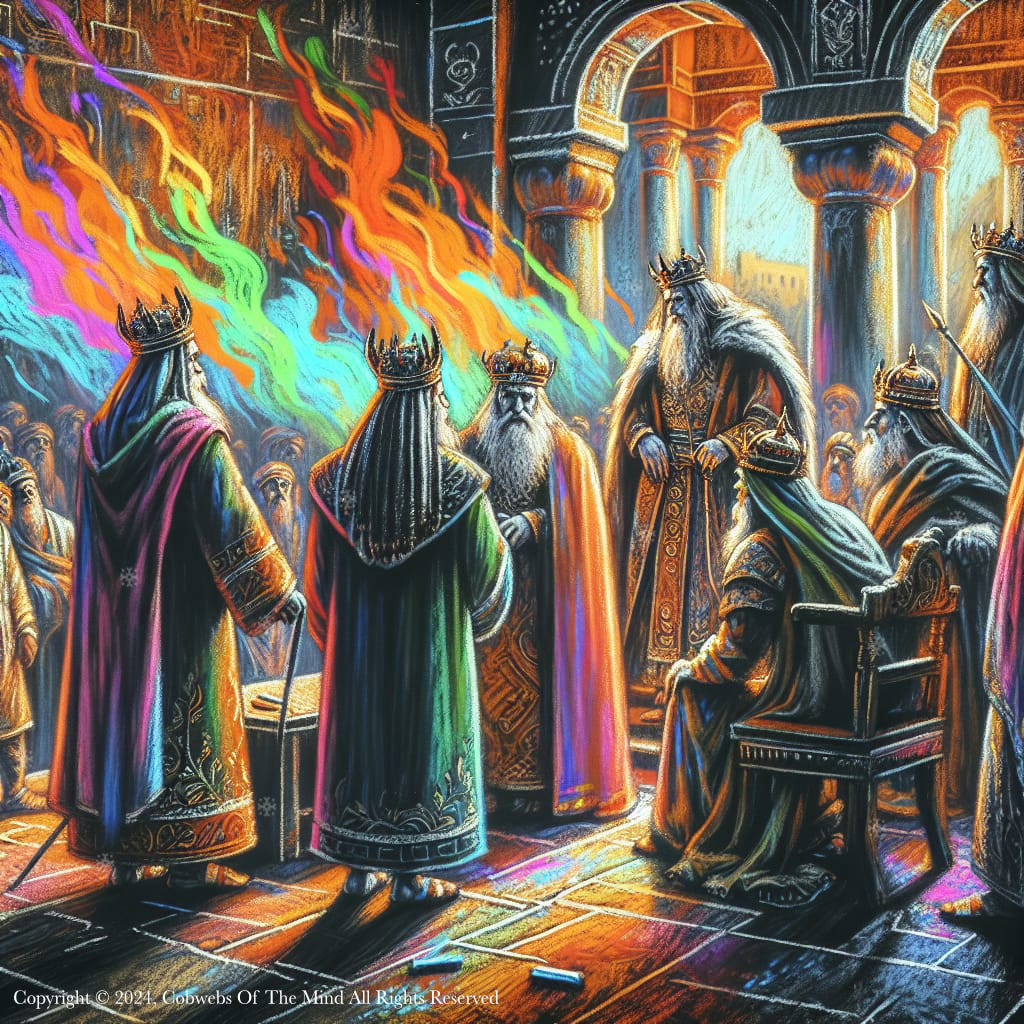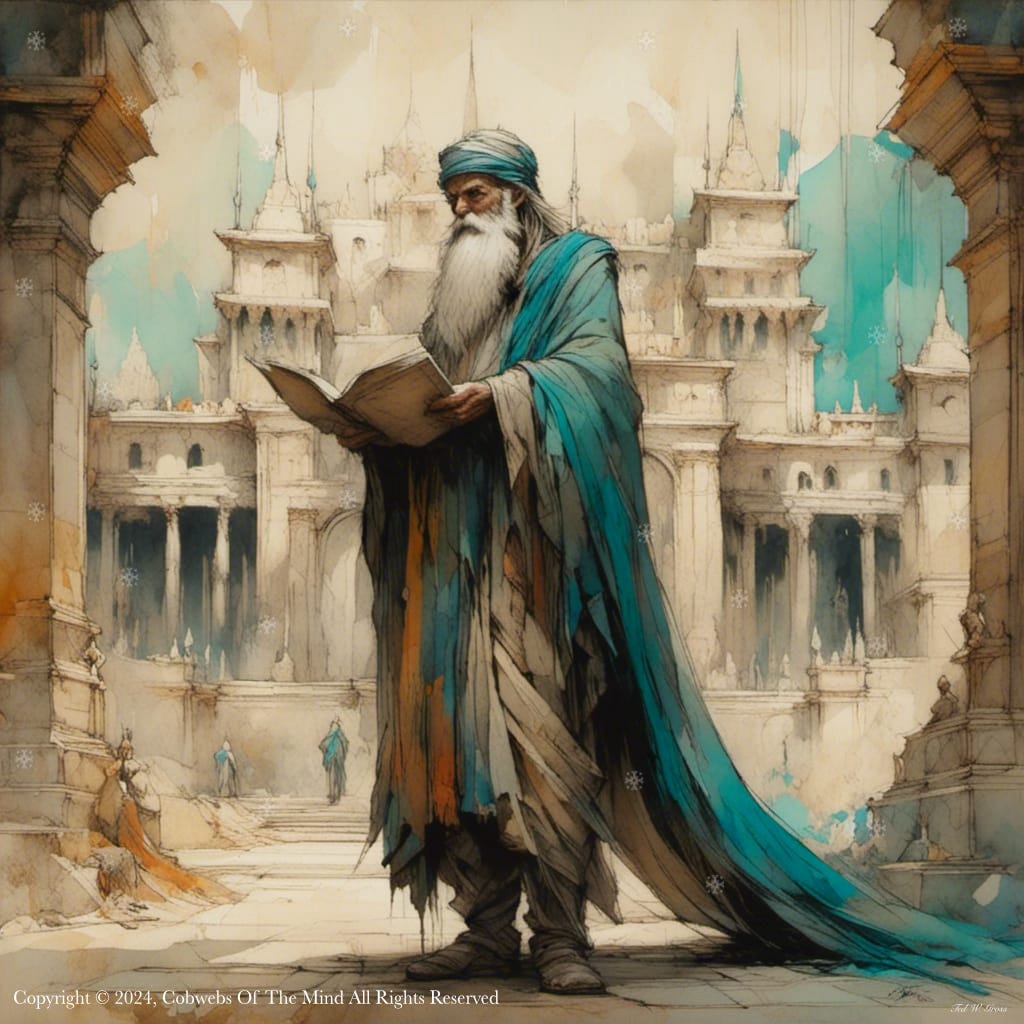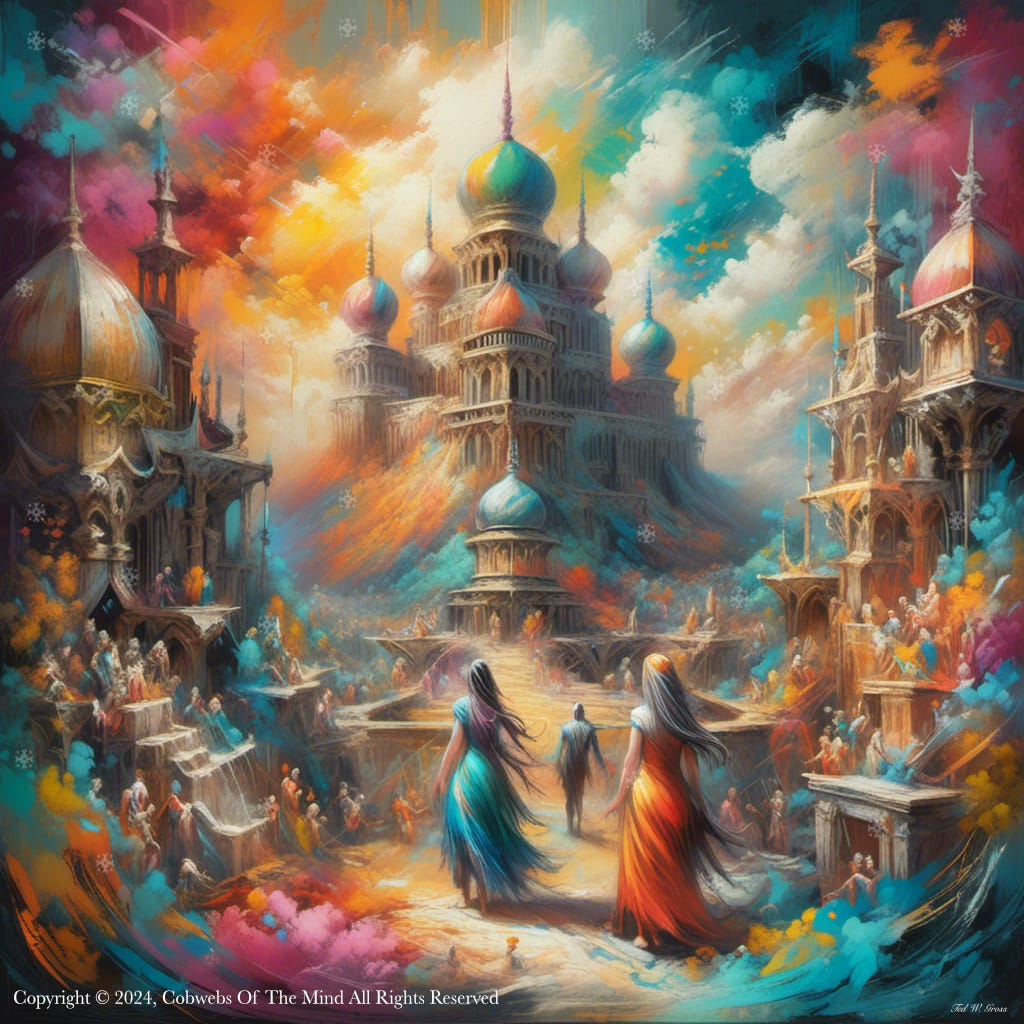Perhaps You Have Attained The Royal Position For Just Such A Crises
The Story of Purim, Fear, Courage & A Strange Dire Promise
While I was preparing this post, with a very specific agenda in mind, that being the upcoming holiday of Purim, beginning this Saturday night,
published his thoughts on my previous post on Substack.The post he was commenting on appears here, where I mentioned him.
God's Forgotten - The Divine & The Mortal
Dear God, I hope you got the letter and I pray you can make it better down here I have been silent for the past 10 days as I decided to take the time to read other Substacks. I thought that I would gravitate to those who were virulently against Israel and what the other side was thinking and writing. I wanted to understand their POV.
Now that you have the history of our exchanges, I am going to try
in a roundabout way. Let me say this for an introduction. The posts that appear in his publication are always informational and has always explained his views in a cogent, intelligent manner. That does not mean I agree with them. It means there is a way without rancor, cynicism, sarcasm, and disrespect to hold an intelligent debate, even here on Substack.Ve’Hamevin Yavin
That is a Hebrew statement dating back eons and used extensively in Talmudic study. It simply means, “Those who will understand will understand." By definition, it implies that those who will not, refuse to, or cannot understand—well, there isn’t any path to enlighten them.
So, “Ve’Hamevin Yavin” is the underlying motif for this post. As usual, there is madness in my method, so I will try to deliver a somewhat cogent explanation where needed.
Perhaps this post should have begun with “Once Upon A Time…” In it, I will discuss the story of Purim, which took place in Shushan, as it is portrayed in the Old Testament in the Book Of Esther. I believe this ancient story has a message we have chosen to ignore.
If you are unfamiliar with the Book of Esther from the Old Testament, I suggest you take 30 minutes to read it. If nothing else, it is a novella with intrigue, mystery, and colorful characters.
And here is an interesting fact. God is not mentioned once in that entire book. Nope. He is not there. Not a clue or hint of the Almighty Power. Many have indeed attributed one verse in the book, “On that night the King could not sleep,” to be referring to God. But in my mind, this is apologetic rhetoric and actually takes away the power of the entire story as it unfolds before us. Bottom line, folks:
There is no mention of God in the entire Book of Esther.
And yet, it was still included in the Old Testament.
Go Figure!
Palace Intrigue
There is an incredible amount of palace intrigue in the book. Haman comes along and decides all the Jews have to be killed or, at the very least, pushed into the sea. Haman has the ear of the King, Achashverus (who is probably Xeres I). In simple terms, Hitler was not the first, nor will he be the last. And let us be clear. According to the book, Achashverus ruled over 127 states and other countries. So we are not talking about a street or a village. We are talking about mass murder.
Through a set of circumstances, Esther becomes the Queen of the land, married to Achashverus. But she has kept a massive secret. Achashverus, Haman, and all others do not know she is Jewish, nor is her uncle, Mordechai, who is part of the remnants of refugees that came to ancient Persia when the First Temple was destroyed—more intrigue. I told you the story gets interesting.
We do not have the time or space to summarize this entire story, so let me get to the point of contention. These few verses have always bothered and intrigued me, so we do not leave the surprise for later.
In the middle of the story, Mordechai, Esther’s Uncle and the one who raised her, enters the courtyard of the King as Mordechai has just discovered Haman’s plan to wipe out all the Jews in the kingdom. In short, Haman wanted them dead or, at the very least, be pushed into the sea.
Mordechai is dressed in rags and walks around the courtyard in full mourning. He has no shame, not even in the King’s courtyard.1
When Mordechai learned what had happened, He tore his clothes and put on sackcloth and ashes. He then went through the city, crying out loudly and bitterly until he came to the palace gate, for one could not enter the palace gate wearing sackcloth.
“Al Tidami BiNafshech”
Now Esther hears about this strange occurrence and gets worried and upset. So she sends a messenger to her Uncle to tell him to stop and get his act together.
At this point, Mordechai relays a message to his adopted niece, who is now Queen in the palace, saying in modern lingo, “Guess what, Esther? You need to stop this plan cooked up by Haman. And to do that, you need to reveal to the King who you really are and who your people are. It is time to step into the batter’s box.”
At first, Esther demures and tries to get out of her Uncle Mordechai’s command, with the excuse that if the King does not call one into his chambers and that individual walks in, they are put to death immediately. Esther notes to her Uncle that she has not been summoned to the King’s chambers for the past thirty days. In other words, Esther may be the original impetus for the famous words from “Alice in Wonderland” when the Queen says, “Off with their heads.”
Mordechai is not one to take “no” for an answer. We see this stubborn streak of his throughout the Book of Esther. He will not bow to Haman, he will not abandon his people, and he certainly will not take any backtalk from his niece, even if she is the Queen.
And when Esther demures, Mordechai sends back a message saying as follows:2
“Do not imagine that you, of all the Jews, will escape with your life by being in the king’s palace. (Do not concern yourself with your own body and soul.)
On the contrary, if you keep silent in this crisis, relief and deliverance will come to the Jews from another quarter, while you and your father’s house will perish.
And who knows, perhaps you have attained your royal position for just such a crisis.”
Esther listens to her Uncle, gets an audience with the King, and the rest of the story unfolds.
Yet, the above quote bothers, intrigues, and brings up deep emotions every single year on Purim, when the Book of Esther is read in the synagogue. Indeed, it makes me cry. I cannot figure it out as there are three assumptions in what Mordechai said.
If you do not do what I tell you, Esther, you will not be spared even though you are the Queen. - “Al Tidami BiNafshech”
Even if you remain silent, relief and deliverance from Haman and his ilk will come from somewhere else we don’t envision.
Consider, Esther, how you got where you are. The Queen of the entire land. Do you think you attained this just because you were beautiful, intelligent, or witty? Do you not see there is another reason why you, Esther, are in the exact position you are in at this specific moment in our history?
The kicker here is that Mordechai was sure if Esther did not act at that very moment, she would:
Disappear from history
Her entire house would be wiped out, and that includes Mordechai.
There would still be deliverance from Haman and his evil machinations.
In modern terms, we may consider this prophetic statement as the words of an obnoxious lunatic. How does Mordechai know all this? And even more telling, from these verses comes a famous line, repeated generation after generation:
“Al Tidami BiNafshech” - “Do not concern yourself with your own body and soul”
How did Mordechai know this? Why did Esther accept this answer even though she was likely to be killed by going to the King’s chambers?
A very religious person will tell you that Mordechai had complete faith and was gifted with vision if not prophecy.
But remember, God is missing from this book. There is no prophecy here. So, what does this mean to us? To modern man? To life as it is after 10/7? What can a centuries-old book about palace intrigue teach us in three short verses?
Relief & Deliverence
From my readings, historical study, and ruminations, I have come to a very simple conclusion. Mordechai was making an educated guess. He had to find the words to convince Esther that now was the time to act—not tomorrow, not a week from now, not even an hour from now, but at this very moment. If she did not act or Esther remained silent, everyone would be doomed.
For those of you who refuse to read the story, Esther succeeds. Haman and his sons are hanged from the very same trees they planned to hang Mordechai from.
The famous line which has marked the holiday of Purim forever is stated:3
“The Jews enjoyed light and gladness, happiness and honor”
Dear
:Your approach is logical. Your arguments are well thought out. Your observance of the situation is cogent and realistic.
But I must take you to task for two points in your piece.
I never held to any of my dreams so strongly that I was ready to pick up a gun for them. I can’t imagine how Ted feels knowing his dream might die. But this won’t be the first time Jews found themselves under foreign rule. And y’all have a remarkable talent for surviving and thriving under adversity.
Is it time to put “Hatikvah” aside next to your old disco LPs? I’m not a prophet. Israel could come out of this round on top. America could provide breathing room by pulling off an Iranian Shock and Awe. But the current situation will certainly be a crossroads in Israeli-Palestinian relations. And postwar Israel will definitely look very different than the Israel of 6 October 2023.
Dream die? No, I am Mordechai. We are all Mordecahi—stubborn, tenacious, free, and proud. We are all Esther. We will not worry about our own existence and souls when the souls of our entire people are at stake.
No, this dream will not die. It may undergo an evolutionary process and become better, more understanding, and more powerful. But no. We may not see where the relief and deliverance will come from, but like Mordechai, we know it will come.
And again, I quote:
I turn again to one of our mutual favorites. Tolkien realized that the human experience is inherently tragic. Every flower must wilt; every empire must fade; everyone we love must die. And yet that entanglement in time gives our lives meaning.
Since 1948, Eretz Israel has become an integral part of the ongoing Jewish myth cycle. We will know the whole story only after its completion. But however it ends, it will be remembered by Jews for centuries to come as a bright, brave shining moment in the history of a people.
I do not know why I always return to this Tolkien poem, which is quoted below. Perhaps it means much more than I am willing to give it credit for.
Roads go ever ever on,
Over rock and under tree,
By caves where never sun has shone,
By streams that never find the sea;
Over snow by winter sown,
And through the merry flowers of June,
Over grass and over stone,
And under mountains in the moon.
Roads go ever ever on,
Under cloud and under star.
Yet feet that wandering have gone
Turn at last to home afar.
Eyes that fire and sword have seen,
And horror in the halls of stone
Look at last on meadows green,
And trees and hills they long have known.
The Road goes ever on and on
Down from the door where it began.
Now far ahead the Road has gone,
And I must follow, if I can,
Pursuing it with eager feet,
Until it joins some larger way,
Where many paths and errands meet.
The Road goes ever on and on
Down from the door where it began.
Now far ahead the Road has gone,
And I must follow, if I can,
Pursuing it with weary feet,
Until it joins some larger way,
Where many paths and errands meet.
And whither then? I cannot say.
The Road goes ever on and on
Out from the door where it began.
Now far ahead the Road has gone.
Let others follow, if they can!
Let them a journey new begin.
But I at last with weary feet
Will turn towards the lighted inn,
My evening-rest and sleep to meet.
Still 'round the corner there may wait
A new road or secret gate;
And though I oft have passed them by,
A day will come at last when I
Shall take the hidden paths that run
West of the Moon, East of the Sun.
But the light of the State of Israel will burn bright, and like the Chanukah candles, even if there is only enough oil for one day, it will last for as long as need be.
The road will go on and on, not in the past tense but in the present and future tense.
This, too, shall pass.
And we will see the return of the days of light, gladness, happiness, and honor.
And so, on the thirteenth day of the twelfth month - that is, the month of Adar - when the king’s command and decree were to be executed, the very day on which the enemies of the Jews had expected them to get them in their power, the opposite happened. The Jews got their enemies in their power.4
All images in this post can be purchased in digital art or printed frames at Cobwebs Of The Mind.
Esther 4:1-2
Esther 4:12-14
Esther 8:16
Esther 9:1

















Conversations are so important. And so very difficult when faceless. You and Kenaz should be commended.
kenaz filan writes contrapuntally of the inevitability of a one-state solution dominated by...palestinians, ( a political nonesuch before 1948). the jordanians didn't want the arab brothers who were refugees, nor did the egyptians, iraquis, lebanese, syrians, saudis, etc. etc. why was that ? why were they willing to have UNRWA as the avuncular squatting decisor, rather than offer to absorb even one refugee in the 97% or so of the landmass that was unquestionably THEIRS? in fact, it as yet the case with gazans today... it's not as if they had NO place to go; they simply had no place to go where they were wanted! Frost wrote : Home is the place/ where, when you HAVE to go there/ they WANT to take you in.... now that we jews have reconstituted their homeland WE have a home, but THEY as yet, do not, nor will they ever.
one-state solution as a historical imperative??? how's that worked for us so far...?